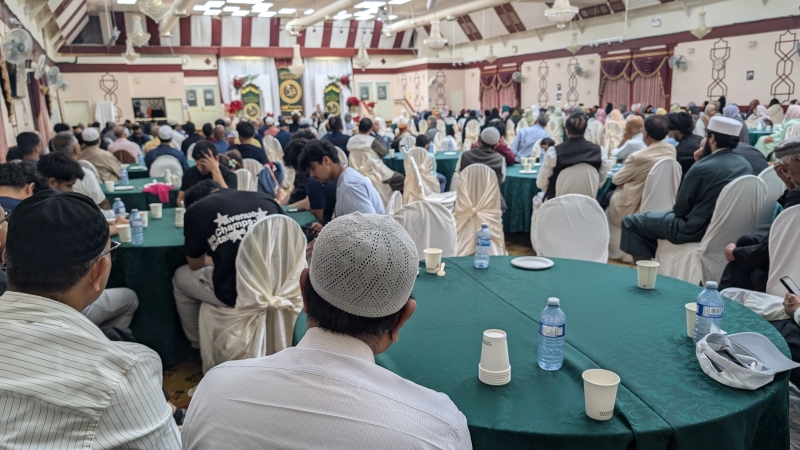



 Crescent International
Crescent International
Muslims in Toronto celebrated the Prophet’s 1500th birth anniversary in a moving and inspiring ceremony on September 6.
In the packed hall of the Islamic Society of York Region, there was great excitement.
The program started with recitation from the noble Qur’an.
Hafiz Amhar Hira recited verses 40-48 from Surat al-Ahzab that describe the Prophet’s role and personality.
Ahmad Khawaja read translation of these verses from Imam Muhammad al Asi’s translation, The Ascendant Qur’an.
ICIT Director Zafar Bangash then welcomed the participants congratulating them on the special occasion.
He highlighted the Prophet’s struggle to transform the jahili society of Arabia through the acquisition of power.
He emphasized that acquiring power is essential to implement the injunctions of Islam in society.
This point was illuminated by appropriate examples from the Prophetic Seerah (life-history) and Sunnah (method).
Dr John Andrew Morrow spoke about ‘Love in Islam’.
Author of scores of books, among them, Covenant of the Prophet with the Christians of the world, Dr Morrow quoted numerous verses from the noble Qur’an to illustrate his point.
Allah (swt) refers to the Prophet (ﷺ) as a “mercy to all the inhabited worlds” (Surat al-Anbiya, verse 107).
This was also the overall theme of the conference on the occasion of the Prophet’s 1500th birth anniversary.
Beautiful banners adorned the stage.
They formed an impressive backdrop, adding to the aura of the occasion.
Imam Muhammad al-Asi, the mufassir and translator of The Ascendant Qur’an, commenced his presentation by citing verse 4 of Surat al-Qamar in which Allah says the Prophet (ﷺ) has been given the most lofty character.
Yet, the mainstream media presents him in a most insulting manner.
He then turned to the issue of how many times the Prophet’s name is mentioned in the Qur’an.
His name Muhammad (ﷺ) has been mentioned four times. Taken with its other form, Ahmed, makes it five times.
Compare that to the name of Musa (as).
It is mentioned 168 times, that of Ibrahim (as) about 68 or 69 times and even Isa (as) is mentioned 25 times.
Lest a casual reader of the Qur’an takes this to mean that the Prophet (ﷺ) is somehow less important than the other prophets, they should consider this.
In the Qur’an, there are hundreds of ayats (verses) that start with the word ‘Qul’, meaning say.
These are addressed to the Prophet (ﷺ) and through him to us.
There are other ayats as well, such as ‘yas’aloonaka’ (they will ask you, O Prophet) or ‘sa’alaaka’ (when they ask you) etc.
Then there are ayats that mention Ya ayyuha ar-Rasool (O Messenger or Apostle), or ya ayyuha al-Nabi (O Prophet).
Altogether, there are hundreds, if not thousands of such ayats in the Qur’an.
The point that he conveyed was that the Prophet (ﷺ) has been mentioned hundreds of times through what is referred to in the Arabic language as ‘concealed pronoun’.
Imam al Asi also elaborated on the issue of hadith literature.
While calling for a careful review of hadith literature to evaluate whether it agreed with Qur’anic commands, he stressed that he was not advocating the rejectoin of all hadiths.
There are some Muslims, referred to as Qur’aniyun, who call for the wholesale rejection of hadiths.
He cautioned against this.
Instead, he pointed out that Muslims should evaluate the hadith literature carefully and ensure that it is compatible with Qur’anic teachings.
Hadith literature was compiled about 100 years after the Prophet (ﷺ) left this earthly abode.
He (ﷺ) had expressly forbidden people from writing hadith because there was a risk of confusing it with the Qur’anic revelation.
In addition to speeches, there were beautiful nasheeds presented by the Salam Canadian band.
A book stall presenting Qur’an translations by Imam al-Asi and Seerah books as well as souvenirs (coffee mugs with the Prophet’s name printed on it) were also available for sale.
ICIT director Zafar Bangash produced a special book for the 1500th anniversary, titled, The Transformative Power of the Seerah.
The event was celebrated in a profound and most respectful manner to honour the Prophet (ﷺ) on his 1500th birth anniversary, alhamdulillah.
The program was live streamed. Here is the link:
https://www.youtube.com/live/TkFTdjjrkBM?si=wNBSXO8Y2zADjID_
